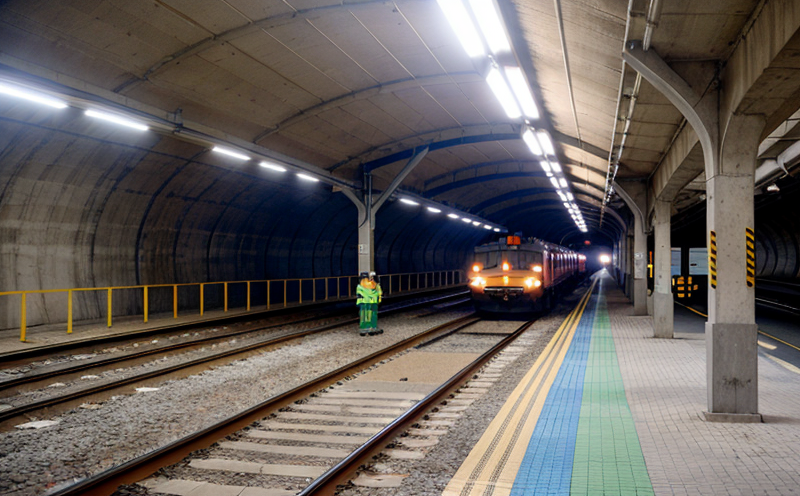EN 50119 Overhead Line Mechanical Testing in Tunnels
The European standard EN 50119 provides essential guidelines to ensure the safe and reliable operation of overhead lines (OHL) used in railway transportation. This standard is particularly relevant for tunnels, where mechanical stress and environmental factors can significantly impact OHL integrity.
Overhead line systems within tunnel environments face unique challenges due to limited visibility, restricted access, and harsh operating conditions. The mechanical testing outlined in EN 50119 ensures that the overhead lines remain robust under these adverse circumstances. This service involves a comprehensive set of tests designed to evaluate the structural integrity, durability, and performance of OHL systems.
The testing procedure focuses on several key areas including, but not limited to, tension, bending, fatigue, and impact strength. These tests are conducted using specialized equipment that simulates real-world conditions found in tunnel environments. The objective is to identify potential weaknesses or vulnerabilities before they lead to operational failures.
Our laboratory adheres strictly to the guidelines provided by EN 50119, ensuring accurate and reliable results. The testing process involves meticulous specimen preparation, application of standardized test procedures, and thorough analysis of data collected during each trial. Our team of experienced engineers ensures that all tests are carried out in compliance with international standards.
The importance of this service cannot be overstated, especially given the critical role played by overhead lines in modern railway systems. Any disruption to these lines can have severe consequences for both safety and efficiency. By conducting thorough mechanical testing as per EN 50119, we help ensure that OHL systems remain reliable and safe.
Our service includes not only the actual testing but also detailed reporting of findings. The reports generated from our tests provide valuable insights into the current state of the overhead lines and any necessary corrective actions required to maintain their optimal performance. This information is crucial for quality managers, compliance officers, R&D engineers, and procurement teams responsible for ensuring the highest standards in railway transportation.
Moreover, this service supports continuous improvement initiatives by offering a proactive approach to identifying potential issues before they escalate into larger problems. By leveraging advanced testing methodologies, we contribute significantly towards maintaining the integrity of overhead line systems within tunnel environments.
Scope and Methodology
| Test Parameter | Description |
|---|---|
| Tension Testing | Evaluates the ability of OHL to withstand tensile forces. |
| Bending Tests | Assesses how the OHL performs under bending stress. |
| Fatigue Strength Checks | Determines the endurance limit of OHL materials over repeated loading cycles. |
| Impact Resistance Evaluation | Measures resistance against sudden impacts or shocks. |
The testing process begins with careful specimen preparation, ensuring that each component represents typical field conditions accurately. Once prepared, the specimens undergo various mechanical stress tests designed to replicate real-world scenarios encountered in tunnel environments. The data gathered during these trials is then analyzed rigorously using advanced analytical techniques.
Our laboratory employs state-of-the-art equipment and facilities tailored specifically for performing EN 50119-compliant testing. This ensures that all measurements are precise and consistent, providing accurate representations of the actual performance of OHL systems under specified conditions.
Industry Applications
The application of EN 50119 mechanical testing for overhead lines in tunnels extends beyond mere compliance with regulatory requirements. It plays a pivotal role in enhancing overall safety and reliability within the railway sector, particularly when dealing with sensitive infrastructure like tunnels.
By identifying potential weaknesses early on through rigorous testing, this service helps prevent costly repairs or replacements later down the line. Additionally, it supports continuous improvement efforts aimed at optimizing operational efficiency while minimizing disruptions caused by unexpected failures.
The insights gained from such tests are invaluable for various stakeholders including quality managers who oversee overall product quality; compliance officers ensuring adherence to relevant regulations and standards; R&D engineers working on innovative solutions that enhance system performance; as well as procurement teams responsible for sourcing high-quality materials and components.
Why Choose This Test
- Precision: Our testing adheres strictly to EN 50119 standards, ensuring precise measurement and analysis of OHL performance.
- Comprehensive Coverage: We cover all critical aspects of mechanical integrity through a range of tests including tension, bending, fatigue strength checks, and impact resistance evaluations.
- State-of-the-Art Equipment: Utilize advanced instrumentation to provide accurate results that reflect real-world tunnel conditions accurately.
- Professional Expertise: Leverage our team's extensive experience in railway transportation testing to deliver reliable outcomes.
- Compliance Assurance: Stay ahead of regulatory requirements by ensuring full compliance with EN 50119 standards throughout the testing process.
- Data-Driven Insights: Generate detailed reports that offer actionable insights into the current state and future needs of OHL systems within tunnel environments.
Choosing our EN 50119 mechanical testing service ensures you receive comprehensive, precise, and reliable results tailored specifically for overhead line applications in tunnels. This approach not only meets but exceeds industry expectations, providing valuable data that can inform strategic decisions regarding infrastructure maintenance and enhancement projects.





